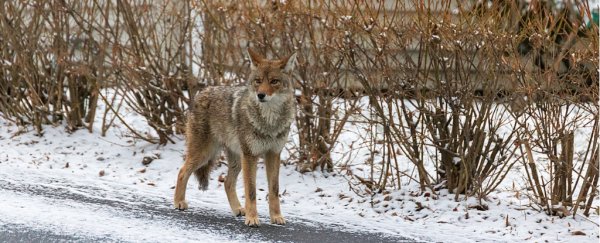The current pandemic isn't just affecting humans, it's also impacting wildlife. As the world locks down to avoid further spread of the devastating coronavirus, there are suddenly far fewer cars on the road, planes in the sky and ships in the water. And nature has surely noticed.
Recently, pumas have been spotted ambling down the streets of Santiago, Chile and coyotes have been combing through San Francisco, while rats have grown increasingly aggressive in their hunt for ever-dwindling scraps, and starving urban monkey gangs brawl over diminishing resources.
Some people started calling it the 'Great Pause'. Now, scientists have come up with a more precise and technical way to describe these exceptional circumstances, outlining what we might learn from their effects.
The term 'anthropause', they explain, is a reference to the "considerable global slowing of modern human activities, notably travel" - which we would be foolish not to study.
"Society's priority must be to tackle the immense human tragedy and hardship caused by COVID-19," the researchers write in a recent commentary for Nature Ecology and Evolution.
"But we cannot afford to miss the opportunity to chart - for the first time on a global scale - the extent to which modern human mobility affects wildlife."
That impact may not always be obvious, or expected. While current lockdowns around the world have left some animals thriving in peace and quiet, others are at greater risk than before.
Endangered species, for instance, are experiencing more poaching during this time, as economic hardship strikes some regions more than others and exploitation of natural resources is increased.
Now is the perfect time to study these complex interactions further, the team argues. It's of paramount importance that field biologists continue collecting data even during lockdowns, as long as appropriate precautions are taken and funding is not diverted from frontline work on the virus.
According to one of the co-authors, behavioural biologist Matthias-Claudio Loretto from the Max Planck Institute of Animal Behavior in Germany, with such invaluable data under our belt we will be able to "investigate if the movements of animals in modern landscapes are predominantly affected by built structures, or by the presence of humans."
And that's a big deal. Current research hasn't been able to tease those two factors apart, and the current circumstances are ideal for further observation.
That's why researchers are calling for a new COVID-19 Bio-Logging Initiative to pool together resources and expertise on fish, birds and mammals from around the world; they have already received over 200 datasets, according to Francesca Cagnacci, senior researcher at the Edmund Mach Foundation in Italy.
The plan is to use electronic tracking devices attached to animals, called 'bio-loggers', to record their movement, behaviour, activity, physiology and habitats, during this unprecedented time. An additional initiative will integrate data from a range of species monitoring programs to assess the impacts of human mobility and activity.
"All over the world, field biologists have fitted animals with miniature tracking devices," says biologist Christian Rutz from University of St Andrews, UK.
"These bio-loggers provide a goldmine of information on animal movement and behaviour, which we can now tap to improve our understanding of human-wildlife interactions, with benefits for all."
This is a tragic time for humans, no doubt, but researchers hope the scientific knowledge we can gain during this crisis will help us tackle the next one, reducing both human and animal suffering in the future.
Earth is currently in its sixth known extinction event, and our co-existence with wildlife leaves much to be desired. Perhaps the current circumstances can teach us something about how to better share this increasingly crowded planet.
"Nobody is asking for humans to stay in permanent lockdown," says animal behaviourist Martin Wikelski from the Max Planck Institute.
"But we may discover that relatively minor changes to our lifestyles and transport networks can potentially have significant benefits for both ecosystems and humans."
In fact, the reduced level of human movement we are currently experiencing only takes us back a few decades; while a lot has changed in those years, reflecting on that change and making small modifications to our modern lifestyles could have sizeable benefits.
Minor changes to our transport networks, for instance, may drastically reduce disruptive effects on animal movement.
"Coordinated global wildlife research during the anthropause will make contributions that go well beyond informing conservation science - it will challenge humanity to reconsider our future on Earth," the commentary concludes.
"There will be unforeseen opportunities to reinvent the way we live our lives, and to forge a mutually beneficial coexistence with other species.
"It would be wonderful if careful research during this period of crisis helped us to find innovative ways of reining in our increasingly expansive lifestyles, to rediscover how important a healthy environment is for our own well-being, and to replace a sense of owning with a sense of belonging."
The comment was published in Nature Ecology and Evolution.
